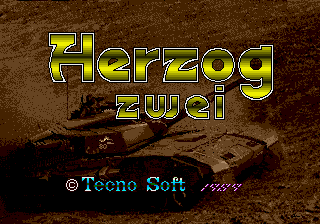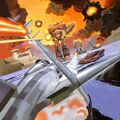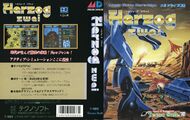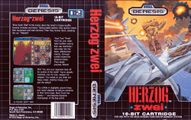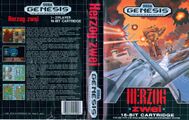Difference between revisions of "Herzog Zwei"
From Sega Retro
m (→References) |
|||
| Line 216: | Line 216: | ||
{{HerzogZweiOmni}} | {{HerzogZweiOmni}} | ||
| + | [[Category:Mega Drive Mini 2 games]] | ||
Revision as of 10:39, 19 August 2022
| |||||||||||||||||||||||||||||||||||
| Herzog Zwei | |||||||||||||||||||||||||||||||||||
|---|---|---|---|---|---|---|---|---|---|---|---|---|---|---|---|---|---|---|---|---|---|---|---|---|---|---|---|---|---|---|---|---|---|---|---|
| System(s): Sega Mega Drive | |||||||||||||||||||||||||||||||||||
| Publisher: Sega (US, Europe), Technosoft (Japan) | |||||||||||||||||||||||||||||||||||
| Developer: Technosoft | |||||||||||||||||||||||||||||||||||
| Genre: Simulation[1] | |||||||||||||||||||||||||||||||||||
| Number of players: 1-2 | |||||||||||||||||||||||||||||||||||
|
Herzog Zwei (ヘルツォーク・ツヴァイ) is a strategy video game developed by Technosoft, released exclusively for the Sega Mega Drive in 1989, and a sequel to Herzog, which was only released for Japanese home computers in 1988. It was published in Japan by Technosoft in 1989 and in North America and Europe by Sega in 1990.
Herzog Zwei is often credited for creating the foundations of the RTS (real-time strategy) and MOBA (multiplayer online battle arena) genres as we know them today. It was also a precursor to the hero shooter genre, as it was the first game to combine shooter and MOBA elements.
In 2013, a spiritual sequel called AirMech Delta was published by Ubisoft.
Contents
Gameplay
In Herzog Zwei, the player controls a unit which can freely transform from a plane to a robot, and must create and transport units to capture structures and destroy enemy bases. It combines concepts from the Thunder Force series (as it stood in 1989) with a strategic element which plays out in real time, as opposed to the more traditional turn-based strategy games which derive from games such as chess.
Along with a single-player mode, it features a split-screen two-player mode where both players are in action simultaneously. There are no pauses while decisions are taken, forcing players to think quickly while on the move. Though the player only controls one unit, a transforming mech, the manner of control foreshadowed the point-and-click mechanic of later games. It introduced much of the genre conventions, including unit construction and resource management, with the control and destruction of bases being an important aspect of the game, as were the economic/production aspects of those bases.
The instruction manual explains the player's role: As the high commander, you're in charge of mobilizing and controlling all troops. You must occupy the neutral bases and gain control of the enemy's advance bases. You decide what weapons to deploy and where to place your forces. You must also protect your occupied territory from enemy attacks. Your final objective --- and the final battle --- is destroying the enemy's base camp.
Mechanics
The mechanics make it a game with a slower feel than most modern RTS games, making for more thoughtful play. The player's view of screen is always centered on the player's transformer. The player can pilot the transformer to any location on the map, while shooting at enemy units, airlifting friendly ground vehicles, or placing purchase orders for more vehicles. If the transformer is destroyed in battle (or runs out of fuel), a new transformer respawns over the player's primary base. Unlimited respawn allows the transformer to engage in suicide tactics, as it is essentially a disposable asset.
Although the vehicle purchasing-menu can be activated from anywhere on the battlefield, only one vehicle may be purchased at a time. The completed order must picked-up from a friendly base (by the player's transformer), before the next purchase can be made. The game has a hard upper-limit of 100 active units (50 per player.) But when a game-session exceeds active seventy units, the console slows down, making play difficult.
Game requires the transformer-vehicle to airlift vehicles for close-inspection and mission-reassignment. Later RTS games use the virtual-console style of interface, allowing direct control of any player-owned vehicle.
To complete the game in single-player mode, the player must defeat the computer on each level four times, each time representing an increasing level of difficulty. When the game is completed, the ending offered differs depending on whether the player played as the first player (red), or the second player (blue). Two-player mode divides the screen into two playfields. Each player can see the opponent's actions, eliminating any element of surprise.
Levels
A key aspect of the game play is how the player interacts with the environments of the different levels. Each of the eight levels takes place in a different location that requires a different strategy for attacking the other side.
Some levels have a large, physical barrier in the middle of the level that prevents a user from launching a direct ground attack at the main base in a timely fashion. For example, the jungle stage Waldung has a large swamp in the middle of the board that slows troops movement and eats up energy.
Other levels, such as the volcano stage Vulkan are covered in lava rivers that will destroy any unit that comes in contact with it. This makes it difficult to launch ground assaults against the main bases as well as the mini-bases as the individual units artificial intelligence is quite limited.
Only three of the levels, Strand, Eisfrei, and Oase, have bodies of water that allow boats to be launched against the enemy. The Abgrund level features a river but the player is not allowed to purchase boat units.
On all levels with the exception of Abgrund, the both sides start off with a certain number of mini-bases already claimed. In Abgrund, all bases are neutral, including those directly near the main base.
Units
| Commander | |
|---|---|
| The unit player controls, Commander is a transformable mecha which can transform into a Jet Figter/Transport. It can pick up friendly units and deploy them into battle. When necessary, player can overwrite the command of the picked-up unit instantly. (Cost of the command will be deducted from the player's account.) In mecha mode (English manual calls it "Infantry Soldier") Commander can fire on ground units and burn very low amount of fuel but he will move much slower. In Jet Fighter mode, Commander can only engage to other enemy Commander in jet mode. Commander will burn more fuel in Jet mode, especially carrying other units. Commander's weapons can never damage enemy base and it needs to return to nearby outpost or main base to refuel and reload its ammo. Unlike original Herzog, player has unlimited number of Commander units as when destroyed, Commander will simply reappear in a few seconds in main base. (Respawn time depends on distance from the point Commander destroyed.) If the Commander is destroyed while carrying a unit, that unit will be destroyed as well. | |
| Infantry | |
| Infantry is the slowest and weakest unit but it is nevertheless essential as it is the only unit can capture outposts. Usually an infantry unit appears whenever a unit is destroyed. Cheapest unit in the game. | |
| FWA | |
| A combat bike with limited firepower and durability. It is the fastest unit in the game and has a very long patrol range. | |
| AMR-51D | |
| An infantry fighting vehicle with medium armor and firepower. Second fastest unit in the game. | |
| Supply | |
| A supply vehicle which can reload ammunation of units in the battleground. It is completely defenceless. | |
| TAX-52 | |
| Main Battle Tank. It has strongest armor and third highest firepower in the game. It is nevertheless quite fast for its' size. | |
| ST-57U | |
| Patrol Boat. Slow but has a very long range and can attack many targets, including enemy bases from afar. Can only be deployed in "Strand", "Eisfrei" and "Oase" levels. | |
| SAM-42 | |
| Self-propelled anti-aircraft weapon. Although it is an air-defence vehicle, it can attack enemy Commanders even when they are on the ground as well, but cannot engage any other unit. Since Commander is the only unit that can fly, SAM can only be used as a defence measure against them. Slow but has a strong armor and highest firepower. | |
| GMR-34A | |
| Static defence Fortification. This stationary double-barrelled turret can fire at enemy units with cannons and can fire missiles to enemy Commander units. (Similar to SAMs) Has very high firepower and armor but also the most expensive unit in the game. |
Commands
Units need to be created with their commands, which will cost additional resources. Commands can be changed anytime by picking up the unit and entering the production screen.
- BDF-1SD: Hold Position.
- AF-001A: Patrol
- AT-101: Engage the enemy then occupy the outpost.
- DF-F02A: Stand guard, engage (when enemy discovered) then return. (when enemy destroyed)
- AT-101H: Occupy the Outpost, engaging the enemies is secondary priority.
- BA-001C: Attack the enemy main base. (most expensive command)
- PW-SS10: Resupply and repair units in the field. (Supply vehicle only)
History
Development
The Western packaging art was created by veteran San Francisco game box illustrator Marc Ericksen, who had previously created the art for Thunder Force II.
Legacy
Herzog Zwei went on to influence future RTS games, particularly 1992's Dune II[7].
With Technosoft closing its doors in 2001 and the status of the intellectual property being unknown, the future of the series is likely sealed.
Production credits
- Main Program: Takashi Iwanaga
- Weapon Program: Haruhiko Ohtsuka
- Map Design: Osamu Tsujikawa
- Character Design: Izumi Fukuda
- Demo Program: Izumi Fukuda
- Music Compose: Naosuke Arai, Tomomi Ohtani
- Sound Effect: Naosuke Arai, Tomomi Ohtani
- Manual Writer: Fumio Sugano
- Herzog: T. O.
- Special Thanks: Marie Hughes, Kamometei
- Copyright: Tecno Soft
Magazine articles
- Main article: Herzog Zwei/Magazine articles.
Promotional material
Artwork
Physical scans
| 70 | |
|---|---|
| Based on 31 reviews | |
| Mega Drive, AU |
|---|
|
Technical information
ROM dump status
| System | Hash | Size | Build Date | Source | Comments | |||||||||
|---|---|---|---|---|---|---|---|---|---|---|---|---|---|---|
| ✔ |
|
512kB | 1989-12 | Cartridge (US/EU) | ||||||||||
| ✔ |
|
512kB | 1989-09 | Cartridge (JP) |
References
- ↑ 1.0 1.1 https://sega.jp/history/hard/megadrive/software_l.html (Wayback Machine: 2020-07-02 23:21)
- ↑ Beep! MegaDrive, "February 1990" (JP; 1990-01-08), page 115
- ↑ https://groups.google.com/g/rec.games.video/c/YIpIXMAWK_k/m/YnrN1lCdJLoJv
- ↑ VideoGames & Computer Entertainment, "May 1990" (US; 1990-0x-xx), page 38
- ↑ Raze, "March 1991" (UK; 1991-01-31), page 59
- ↑ Sega Power, "July 1991" (UK; 1991-06-06), page 27
- ↑ http://www.above-the-garage.com/rblts/vie16b.htm (Wayback Machine: 2003-05-04 03:49)
- ↑ 1700 igr dlya Sega, "" (RU; 2001-xx-xx), page 95
- ↑ Aktueller Software Markt, "Avril 1990" (DE; 1990-03-30), page 78
- ↑ Beep! MegaDrive, "February 1990" (JP; 1990-01-08), page 69
- ↑ Complete Guide to Consoles, "Volume IV" (UK; 1990-11-xx), page 31
- ↑ Console XS, "June/July 1992" (UK; 1992-04-23), page 130
- ↑ Cool Gamer, "9" (RU; 2002-10-13), page 102
- ↑ Computer & Video Games, "April 1990" (UK; 1990-03-16), page 103
- ↑ Electronic Gaming Monthly, "May 1990" (US; 1990-xx-xx), page 20
- ↑ Entsiklopediya luchshikh igr Sega. Vypusk 1, "" (RU; 1999-xx-xx), page 321
- ↑ Entsiklopediya luchshikh igr Sega. Vypusk 3, "" (RU; 2000-xx-xx), page 107
- ↑ Famitsu, "" (JP; 1989-xx-xx), page 1
- ↑ The Games Machine, "March 1990" (UK; 1990-02-08), page 50
- ↑ Game Informer, "May 1999" (US; 1999-0x-xx), page 72
- ↑ Igry Sega Luchshiye iz luchshikh. Vypusk 2, "" (RU; 2001-08-27), page 207
- ↑ Joystick, "Novembre 1990" (FR; 1990-1x-xx), page 102
- ↑ Sega Mega Drive Advanced Gaming, "January 1993" (UK; 199x-xx-xx), page 63
- ↑ Mega Drive Fan, "May 1990" (JP; 1990-04-07), page 89
- ↑ Mega, "June 1993" (UK; 1993-05-20), page 20
- ↑ Mega, "August 1994" (UK; 1994-07-21), page 79
- ↑ MegaTech, "Xmas 1991" (UK; 1991-12-06), page 78
- ↑ Mean Machines Sega, "October 1992" (UK; 1992-09-xx), page 139
- ↑ Play Time, "6/91" (DE; 1991-05-10), page 116
- ↑ Power Play, "4/90" (DE; 1990-03-16), page 123
- ↑ Raze, "March 1991" (UK; 1991-01-31), page 58
- ↑ Sega Power, "July 1991" (UK; 1991-06-06), page 26
- ↑ Sega Power, "October 1991" (UK; 1991-09-05), page 53
- ↑ Sega Pro, "Christmas 1991" (UK; 1991-12-12), page 61
- ↑ Sega Pro, "April 1993" (UK; 1993-03-11), page 66
- ↑ Sega Saturn Magazine, "September 1995" (JP; 1995-08-08), page 85
- ↑ Tricks 16 bit, "Tricks Sega Gold 800 igr" (RU; 1998-03-20), page 16
- ↑ User, "Noémvrios 1990" (GR; 1990-1x-xx), page 63
| Herzog Zwei | |
|---|---|
|
Main page | Comparisons | Maps | Magazine articles | Video coverage | Reception | Region coding | Technical information | Bootlegs
| |
- 1-2 player games
- JP Mega Drive games
- All JP games
- US Mega Drive games
- All US games
- EU Mega Drive games
- All EU games
- UK Mega Drive games
- All UK games
- AU Mega Drive games
- All AU games
- CA Mega Drive games
- All CA games
- Mega Drive games
- 1989 Mega Drive games
- All 1989 games
- Mega Drive simulation games
- All simulation games
- All games
- Credits without source
- Credits without reference
- Old technical information
- Herzog Zwei
- Mega Drive Mini 2 games

